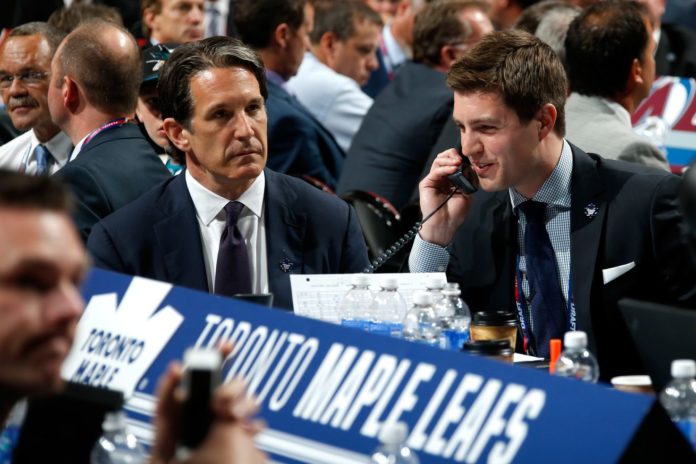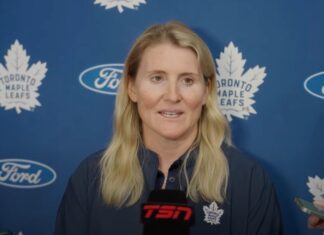
In today’s Leafs Links, Kyle Dubas recounts his first ever NHL trade, the mentorship of Lou Lamoriello, and the marriage between analytics and traditional scouting in hockey operations.
Leafs Links
Kyle Dubas on analytics and traditional scouting: “They key is letting everyone know you’re not trying to one-up the other side” (NHL)
Kyle Dubas joined a virtual NHL GMs roundtable alongside John Chayka, Julien BriseBois, and Bill Guerin.
On the mentorship of Lou Lamoriello:
Especially in the last season, the amount I learned from Lou was incredible — not even just how to operate the team and a sports franchise, but how to treat people, the importance of your family along the way, the importance that he put on me to make sure I was taken care of in that aspect of my life, and pushing me to always make sure that our people are always doing the same thing. That may not always be his reputation to his general public, but it’s one of the things I really learned from him.
He is the type of person that no matter what you are going through and what you have on the go and what kind of jam you are in, he is going to be more upset if you don’t call him and ask for his help than if you do and you’ve done something to screw up. That was among the many, many things that I learned from him. We still talk all the time. It is sometimes about hockey but mostly about life and what is happening. I know the age gap between us is immense, but for me, it has become a great mentorship and friendship. I know my whole family feels the same about Lou as well.
On the uncomfortable decision to fire his head coach:
We had made a change in the Soo during the second season and a few changes during the first year here. This year was the first time in a long time that I had actually gone through it with someone you work so close with day-to-day and you just feel you have to make the change with. It is certainly not something that is done haphazardly where you wake up one and say, “Today is the day.” It is usually an accumulation of a lot of things.
I don’t know that there are many bad parts to the job, but I think certainly, when you let people go knowing the impact it has on them… Some are obviously worse than others depending on the relationship you have with them, but it is difficult. A lot of time goes into it. A lot of discussions with people above you go into it. They are certainly not easy, but you have to do what you think is best for the future of your program. Sometimes that is some very difficult conversations with some people that you worked with a long time.
On his first-ever GMs meeting:
I had to do the meeting in 2015 between Dave Nonis being let go and Lou coming in. I was scared shitless when I walked into the room in Vegas. That was one of the most nervous times I’ve had in my life. Shanny told me before I went, “Just don’t say anything to anybody.” I went in there, and I’ve known Ronny Francis my whole life so he was the only person I felt I could talk to, and then I just went and sat in my chair and took notes for the meeting and got up and left. I was nervous as anything. I really didn’t feel like I belonged in there. I had only been in the league for one year. We were still a month away from having Lou hired. I just went in there, took my notes, and got on the plane with some of the other guys and go on the way to Florida for the draft. It was certainly very intimidating at that time.
On his first-ever NHL trade (for Zach Hyman) with Florida:
It was during that first stretch in 2015. It was with Dale Tallon, who was the GM with Florida at the time and is again now. He was great to deal with. I don’t think you could ask for somebody more straightforward and blunt about their position on it. It was kind of refreshing. It was actually very helpful to me because he referenced it a number of times that it was my first trade. At first, I thought it was some sort of setup to pull one over. In getting to know Dale and getting to know him more, he was just trying to be helpful. It ended up working out for them and for us. That was June 2015.
Some of them have been much more nerve-wracking. You’re moving out assets in the Jake Muzzin deal and wondering if this is the right thing. You could get caught up in what you are giving up versus what you are returning back.
It is always nerve-wracking, I think, but you try to just educate. You are largely dealing with a great group of people, so it’s all pretty good.
On the widespread adoption of analytics throughout the league:
If you go back to 2012-13, it was more of a polarizing topic. I think now, especially if you can get all sides working together, the key is letting everyone know you’re not trying to one-up the other side. It is: What can both sets of information tell you about every player and every decision that you make? How can they help one another? How can they stop one another from going down a negative path and make a bad decision? I think that is the key. It is just getting over, at first, the inherent battle between the subjective scouting data and different things you are picking up and the objective data from analytics, and just trying to build it all together so that everyone knows you are in it together and are trying to help one another out versus trying to show that one element is better than the other.
McKenzie on NHL’s strong desire to finish 2019-20, willingness to delay start to 2020-21 into December (TSN1050)
On Leafs Lunch, Bob McKenzie discussed just how late the NHL may be willing to push it within the calendar to finish the 2019-20 season.
One of the things we may have to get our heads around here is just how long the NHL will wait or the the amount of time they will use to try to conclude the 2019-20 season — so much so to the point that we may be looking at the 2020-21 season not starting until maybe December, and still getting in a full 82 games, and obviously going into the depths of summer 2021.
There are a couple of things that work on that: 1) They want to give themselves as much runway as possible to finish 2019-20. Even though there are a lot of people who want closure — they just want the league to say, “season is canceled — that’s it. 2019-20 is done.” Or they think, “There are way more important things to worry about in our world right now, and trying to get some semblance of the regular season and playoffs — I don’t want to hear about it.”
Fair enough, but the NHL, NHL is highly, highly, highly motivated — to the tune of 350-500 million dollars — to get some semblance of a 2019-20 season finished and a playoff in. That’s the money the would have to rebate television rights holders — national and regional — and sponsorships, and what they might be able to get in the way of sponsorships for people watching the Stanley Cup Playoffs, whether it’s in July, August, September — whatever.
The second reason why a start of next season in December might make more sense is that the NHL, if they have to, will play before empty stands. They know if they are going to resume 2019-20, that is going to likely be the scenario. If they start thinking six-seven months down ther road, they start to think to themselves, “We don’t want to start next season with empty stands. That is going to be a huge financial impact on us. If we wait until December to start our season, maybe we will have the all-clear for maybe not full capacity, but 50 or 75% — more than zero.”
There are two reasons, then, why the notion of December hockey to start next season might make sense. As I always qualify it, everything is so contingent on so many different things — levels of government, health authorities. There are so many moving parts on this. We all know that Bill Daly talked about how if they get one positive test, it doesn’t necessarily shut the whole thing down. They are going to have to have protocols in place for massive amounts of testing to ensure that it doesn’t run wild if one player gets it.
There are so many moving parts, and we don’t know if any of it is going to come to pass, but the NHL is preparing for all of those possibilities.
Dreger on optimism about season resumption, the likelihood of T.O. as neutral site (TSN1050)
Darren Dreger discussed his level of optimism about the season resuming in the wake of Bill Daly’s comments over the weekend that a positive test wouldn’t necessarily be cause for a league shutdown again if play were to resume.
Of course, Toronto is at least being looked at the Atlantic destination when it is safe for hockey to return, but as Chief Matthew Pegg talked about, they are not having those conversations at his level. I want to hear it from Health Canada. I want to hear it from the CDC. I want to hear one of the provincial health authorities come out and say, “It is not inconceivable that these players could move into phase two and be allowed to go back to their training facilities in their NHL cities by May 15 or the third week of May.” I haven’t heard that yet. Because I haven’t heard that from any health officials, I am still skeptical.
Darcy Tucker on Bryan McCabe as a roommate (Sportsnet 590)
Darcy Tucker joined Hockey Central to recount some old junior stories as well as his favourite roomates over the years.
Bryan McCabe and I roomed our whole time together here in Toronto. We even stayed roomies when you are allowed to take your own room on the road. It’s basically because I made him pay for every room service bill that came to the room because I wasn’t making as much as him. I made sure that he paid for all of the service to the room, so that’s why I stayed with him the whole time.
He was great. We had the same sort of mentality towards the game. We wanted to play hard and do the right things. He was good making sure I was calm. I kind of ramped him up from time to time when need be. It was a good combination of the two of us.























![[Leafs Links] Reports: Sean Walker likely to be moved, Maple Leafs have inquired; the latest on Chris Tanev, Noah Hanifin, Adam Henrique, Scott Laughton, Jakob Chychrun & more Sean Walker linked to the Maple Leafs](https://mapleleafshotstove.com/wp-content/uploads/2024/01/sean-walker-maple-leafs-flyers-218x150.jpg)
![[Leafs Links] The asking price for Sam Lafferty and Vladislav Gavrikov, the latest on Patrick Kane, and is Toronto lurking as a darkhorse on Timo Meier? Patrick Kane, Chicago Blackhawks trade rumours](https://mapleleafshotstove.com/wp-content/uploads/2023/02/patrick-kane-blackhawks-218x150.jpg)
![[Leafs Links] Marlies head coach names a defenseman to look out for in the Leafs’ farm system; Bruins sniffing around on Chychrun, Schenn; a timeline for Patrick Kane and Jonathan Toews’ deadline decisions Jakob Chychrun, Toronto Maple Leafs trade target](https://mapleleafshotstove.com/wp-content/uploads/2022/02/jakob-chychrun-218x150.jpeg)









